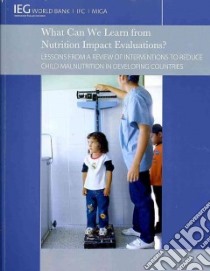What Can We Learn from Nutrition Impact Evaluations? - 9780821384060
Un libro in lingua di World Bank (COR) edito da World Bank, 2010
- € 20.60
- Il prezzo è variabile in funzione del cambio della valuta d’origine
Evaluation SummaryWhat Can We Learn from Nutrition Impact Evaluations?High levels of child malnutrition in developing countries contribute to mortality and have long-term consequences for children's cognitive development and earnings as adults. Recent impact evaluations show that many different interventions have had an impact on children's anthropometric outcomes (height, weight, and birth weight), but there is no simple answer to the question “What works?” to address the problem. Similar interventions have widely different results in different settings, owing to differences in local context, the causes and severity of malnutrition, and the capacity for program implementation. Impact evaluations of programs supported by the Bank, which are generally large-scale, complex inter-ventions in low-capacity settings, show equally variable results. The findings confirm that it should not be assumed that an intervention found effective in a randomized medical setting will have the same effects when implemented under field conditions. There are many robust experimental and quasi-experimental methods for assessing impact under difficult circumstances often found in field settings.The relevance and impact of nutrition impact evaluations could be enhanced by collecting data on service delivery, demand-side behavioral outcomes, and implementation processes to better understand the causal chain and what part of the chain is weak, in parallel with impact evaluations. It is also important to understand better the distribution of impacts, particularly among the poor, and to document better the costs and effectiveness of interventions. High levels of child malnutrition in developing countries are contributing to mortality and present long-term consequences for the survivors. An estimated 178 million children under age 5 in developing countries are stunted (low height for age) and 55 million are wasted (low weight for height). Malnutrition makes children more susceptible to illness and strongly affects child mortality. Beyond the mortality risk in the short run, the developmental delays caused by undernutrition affect children's cognitive outcomes and productive potential as adults. Micronutrient deficiencies—vitamin A, iron, zinc, iodine, for example—are also common and have significant consequences. Progress in reducing malnutrition has been slow: More than half of countries are not on track to achieve the Millennium Development Goal of halving the share of children who are malnou-rished (low weight for age) by 2015. The food price and financial crises are making achievement of this goal even more elusive. The World Bank has recently taken steps to ex-pand its support for nutrition in response to the underlying need and the increased urgency due to the crises. WHAT DO WE KNOW ABOUT REDUCING MALNUTRITION? The increased interest and resources focused on the problem of high and potentially increasing rates of undernutrition raises the question, what do we know about the causes of malnutrition and the in-terventions most likely to reduce it? The medical literature points to the need to inter-vene during gestation and the first two years of life to prevent child malnutrition and its consequences. It suggests that investments in interventions during this window of opportunity among children under 2 are likely to have the greatest benefits. Recently published meta-analyses of the impact evaluation literature point to several interventions found effective for reducing undernutrition in spe-cific settings. However, there are limitations to the generalizability of those reviews' findings, particularly in the context of large-scale government programs most likely to be supported by the World Bank. The reviews tend to disproportionately draw on the findings of smaller, controlled experiments; there are few examples of evaluations of large-scale programs, over which there is less control in implementation. In reviewing a large number of stu
Informazioni bibliografiche
- Titolo del Libro in lingua: What Can We Learn from Nutrition Impact Evaluations?
- Sottotitolo: Lessons from a Review of Interventions to Reduce Child Malnutrition in Developing Countries
- Lingua: English
- Autore: World Bank (COR)
- Editore: World Bank
- Collana: World Bank (Paperback)
- Data di Pubblicazione: 27 Agosto '10
- Genere: MEDICAL
- ISBN-10: 0821384066
- EAN-13: 9780821384060


